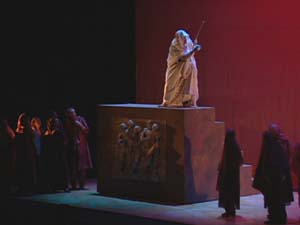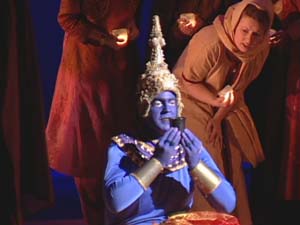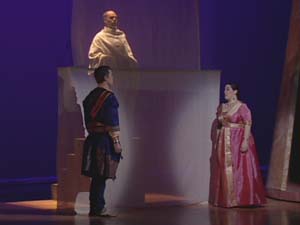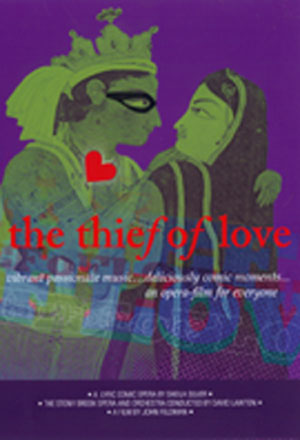Synopsis with Stills:
The action takes place in a mythical kingdom in ancient India.
Act 1, Scene 1

The beautiful and brilliant Princess of Knowledge, Vidya, genuinely wanting to find a husband who is smart enough for her, has vowed to marry any man who can defeat her in debate. As the curtain rises, she is in the middle of defeating yet another challenger. Her parents, angry and fearful that she will never find a husband, urge her to let the next one win. She refuses, insisting that she deserves a man who is truly her equal. Then, to everyone’s shock, a frightening ashen-smeared ascetic sannyasi enters and challenges Vidya to debate. He declares that if he wins, she must become an ascetic and follow him begging for the rest of her life.
As the crowd disperses, the sannyasi follows Hira, flower woman to the palace and confidant to Vidya. Alone with her, he removes his elaborate disguise and reveals himself to be Sundar, Prince of Kancipur. Years ago Hira was his nursemaid. Tenderly the two are reunited and Sundar tells her of his desire for Vidya and his fear of humiliation if she were to defeat him in debate. Hira agrees to help and tells him about an unknown secret tunnel leading to Vidya’s chambers. Planning to enter Vidya’s chambers through the tunnel that night, Sundar composes a mysterious love poem to be delivered to Vidya with flowers. This, he hopes, will arouse her desire, weaken her resistance, and prepare her for his nocturnal visit.
Act 1, Scene 2

Vidya is in her chambers studying for the upcoming debate. Hira brings the flowers and the love poem, which produce the desired effect. The Princess and her maids sit down for the evening prayer, chanting to the goddess Kali. In the middle of the chant strange knocking sounds are heard, the room shakes–they fear it is the goddess’ anger. Tension rises until Sundar bursts in through the floor. Sundar is so handsome the maids are convinced that he is a god incarnate, but Vidya suspects that he is the author of the seductive poem she received earlier. The maids are eventually dismissed, and Sundar and Vidya are left alone together. She tries to engage him in intellectual discussion, but he turns her words to erotic illusion and romance. Sundar’s efforts at seduction almost succeed, but at the last minute Vidya recoils from his embrace, furious that he has tried to compromise her virtue. He pleads that he only wanted her to love him. She orders him out, and he leaves crestfallen.
Act 2, Scene 1

Vidya, confused and upset by the previous night’s events, is comforted by Hira, who urges her to open her heart to love. The King and Queen enter in a huff. They have learned that a man was in Vidya’s room and accuse her of having given herself to a thief. The maids come to her defense, insisting that it was a god. The guards, two numskulls, search the room, the tunnel entrance is found, and the guards conclude the visitor was a demon. All wonder who he really was. Finally a plan is devised to test whether the nocturnal visitor is a god, a demon, or a man. Hira, having heard everything, goes off to warn Sundar.
Act 2, Scene 2

Vidya’s quarters have been prepared for the reception of a god. The chorus enters in processional. As they chant, Sundar calls from within the tunnel. Vidya tries to warn him that a trap is set, but his voice gets closer and closer until he finally emerges in godly attire, playing his new role magnificently. He pompously accepts the sacred wine which will initiate the test and then proceeds to perform incredible feats. First a golden hue surrounds him and then fire spews forth from his hands. The chorus chants wildly and bows in obeisance, convinced of his godhood. At the last minute, a snag in his trickery reveals Sundar’s deception. The crowd, furious, seizes him.
Act 3, Scene 1

Sundar in his prison cell and Vidya in her bedroom dream the same dream: A god appears to them and instructs them in the true nature of love. They come together in their mutual dream and exchange wedding vows as the god looks on. As the dream ends, Hira wakes Sundar and helps him escape. Simultaneously Vidya’s maid wakes her. Each exclaims: “I had a dream, the most beautiful dream….”
Act 3, Scene 2

In the palace courtyard, the debate between the sannyasi (Sundar in disguise) and Vidya is about to begin. The subject is the nature of love as described in the ancient scriptures. The sannyasi begins by quoting lines which Vidya recognizes as the words she herself spoke to Sundar when he tried to seduce her. But how could the sannyasi know these very words? Then the sannyasi repeats what Vidya said in her dream the night before. Can he read her mind? Vidya, rattled, can barely respond. The crowd fears she is losing. But gradually she begins to realize the identity of the sannyasi and in a burst of confidence, expounds magnificently. The crowd is relieved. Sundar, angry and afraid of humiliation, abruptly cedes the debate, insisting that the Princess is indeed the smarter one. Then to everyone’s surprise Vidya insists that it is she who must yield to him–the one man who has moved her heart. She gently removes his disguise and they kiss. The King, upon seeing the trickster, orders the guards to hang him. Sundar pleads for his life, reveals his true identity, and declares his love for Vidya. He argues that since he and Vidya have already made their marriage vows before the gods, he is already the King’s son and the King can hardly execute his own son! The Queen, realizing that her daughter has finally made a good match, convinces her husband to relent. All ends happily as the couple is united.







